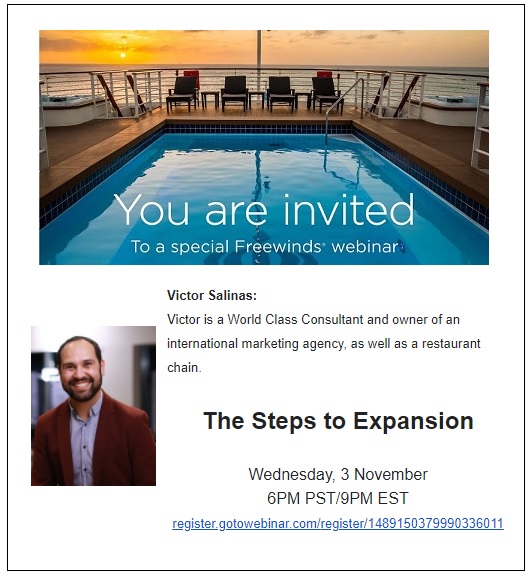
At almost the exact same time yesterday, about 2 pm Eastern, Scientology’s “religious arbitration” was being litigated in both Los Angeles and Atlanta yesterday.
While we were watching the attorney for Danny Masterson’s accusers answer questions from appellate justices on a live feed in Los Angeles, in Atlanta the federal Eleventh Circuit finally issued a ruling on the Garcia appeal that had been argued in July 2020.
In both cases, the prospects for former Scientologists suing the church have become pretty dim.
The Eleventh Circuit affirmed a ruling by Tampa federal Judge James Whittemore who accepted the results from a Scientology arbitration over the objection of Luis and Rocio Garcia, a California couple who said that the the 2017 proceeding was a joke: They weren’t allowed an attorney, they couldn’t get a transcript, and Scientology’s “International Justice Chief” Mike Ellis disallowed about 90 percent of the evidence that the Garcias had brought with them.
But the federal appeals court has decided that this treatment wasn’t “unconscionable,” and the arbitration stands.
Meanwhile, in the Danny Masterson lawsuit in Los Angeles, appellate justices kept saying that the situation might not yet be “ripe” since an arbitration hasn’t yet taken place. More than once, they suggested it was hard to decide what to do since there was no way to know how an arbitration might go.
Yes, we’ll repeat that: At the very same time that the Eleventh Circuit in Atlanta was certifying the way the Garcias had been treated in a kangaroo court that disallowed 90 percent of their evidence and didn’t even let them have a transcript, justices in Los Angeles were alleging that there was no way to know what the women accusing Danny Masterson and Scientology of harassing and stalking them might go through if they too have to go to arbitration.
And not only was the Garcia case there to serve as an example — and Luis Garcia himself submitted a declaration to the court just weeks ago to make sure these justices in Los Angeles knew what he’d been through — but it was only lightly touched on that in this lawsuit, the plaintiffs are alleged rape victims who say they’d be re-traumatized to sit in an arbitration that, the lower court ruled, their alleged rapist can take part in.
Really? There’s no way for the Los Angeles justices to know what an arbitration would look like until it happens?
It was one of many stunning examples of cognitive dissonance yesterday that left our head swimming. So we decided it was better to turn to a couple of people who can make more sense out of the world of appellate courts.
Michael Helfand is a Pepperdine professor who specializes in religious arbitration. TX Lawyer specializes in appeals and has helped us a great deal in recent years.
Both of them told us they were underwhelmed by the performance of Marci Hamilton, the constitutional scholar representing Masterson’s accusers in the Los Angeles hearing. (Over about an hour, Hamilton and two attorneys for Scientology were heard by three justices of the 2nd Appellate District, which will issue a ruling in the next three months.)
“It certainly seemed like the court was looking to get Professor Hamilton to give an explanation of what was uniquely wrong with this kind of religious arbitration and she did not seem to want to give it,” Helfand told us last night.
Indeed, in the weeks before the hearing the justices had made it pretty plain what they were interested in, and that was a discussion about Scientology’s particular brand of arbitration and whether, with its all-Scientologist arbitrating panel, it could be considered neutral under the law.
And in her response to that question, we thought Hamilton had, in a couple of short letters, answered that question well, pointing out how inherently unfair Scientology’s version of arbitration was. (This is not the kind of “independent arbitration” that you might go through in a dispute with a car dealer or medical provider.)
Helfand said it surprised him that Hamilton didn’t foreground those arguments about neutrality yesterday, similar to the ones he’s focused on like setting qualification standards for arbitrators (Scientology’s arbitration requires a panel of three Scientologists in good standing.)
In the hearing, Hamilton didn’t address those specific questions that the justices seemed interested in and instead kept with one argument that has not succeeded in other appeals: That because the plaintiffs are no longer Scientologists, they should not be subject to contracts they signed in a religion they don’t belong to anymore.
“This is a violation of my clients’ First Amendment rights to exit a religion,” she said. But it was pretty quickly obvious that the justices weren’t swayed by this argument.
“As you know it’s not what I would have argued. I would have made arguments that I’ve made in the past,” Helfand said.
He pointed to a previous article he’s written that zeroes in on Scientology having too much say in which arbitrators can serve by making it a religious test: “The problem with this argument is that it would empower one party to determine which prospective arbitrators are, and which are not, eligible to serve as members of the arbitral tribunal. And granting one party authority to either control the arbitrator selection process or to circumscribe the pool of eligible arbitrators renders an arbitration provision unconscionable precisely because it threatens to undermine the neutrality of the arbitration panel.”
It really seemed like the justices yesterday were asking for this kind of specific questioning of Scientology’s setup, but instead they got a First Amendment argument they weren’t asking for.
TX Lawyer was equally unimpressed. He sent us a lengthy rundown on the hearing.
I always warn people not to read too much into an appellate court’s questioning, but then of course we all go ahead and do it anyway. At one point or another, all three justices suggested that it would be much easier to sort out all this mess after the case has gone through with the arbitration, because that would give them the concrete facts they need to determine whether the proceeding is fair. If I had to guess what the outcome will be here, that’s the option I would bet on.
I thought Marci Hamilton’s presentation for the plaintiffs was underwhelming. The court had made it clear ahead of the hearing that it wanted to know whether Scientology’s arbitration system could be “neutral.” Yet she barely said a word about that question, focusing instead on vague First Amendment issues. If I were in her position, my plan would have been to hammer Scientology for all the reasons their system was inherently biased against my clients, and backed it all up with specific references to the evidence in the record that prove it. She also, IMHO, wasted a fair amount of time talking about Marsy’s Law, which the justices did not seem to be interested in at all. Try to read the audience next time.
William Forman did a better job for CSI, although his job is almost necessarily easier because he’s defending a written arbitration agreement. Courts almost reflexively enforce arbitration agreements, after all. His main theme was simply that this was what the parties had agreed to in their contracts. I thought he made a pretty good point when he tied the lawsuit to the religious arbitration agreements to the various church doctrines the plaintiffs discuss in their complaint. But he may have also stepped in it a bit in affirming one justice’s hypothetical question about whether he’d be obligated to arbitrate if he had engaged in just one Scientology service way and then gets hit by a church vehicle 20 years later. That judge was clearly looking for some kind of limiting principle, and Forman didn’t identify one in response. But at least he was clear and direct in answering that the hypothetical justice would be headed to arbitration because that’s what he agreed to do back in the day.
Matthew Hinks, for RTC, was wise to limit his time to a single subject, since all he had was five minutes. And he even picked one — namely, Marsy’s Law — that his CSI colleague hadn’t addressed. I laughed when one of the justices cut off Hinks’ explanation of all the procedural reasons the plaintiffs supposedly hadn’t preserved the issue properly. We all get shrugged off from time to time with some version of “Yeah, yeah, we’ve read your briefs.” But I thought his explanation of why the law doesn’t apply here was a good and sensible one: Marsy’s Law was written to protect victims in the context of a criminal case, not plaintiffs in a civil lawsuit or arbitration. It felt like the justices agreed, or at least they didn’t question the validity of that claim.
I was a little surprised Andrew Brettler didn’t have anything to say on behalf of Masterson. It seems like he probably doesn’t spend a lot of time in appellate courts, however, since he tried to take a pass by asking to “reserve” his 5 minutes. That resulted in the panel telling him that he didn’t have to use his time, but he couldn’t just keep it. (When I have leftover argument time I’m not using, I like to say I’m returning it to the court.)
Hamilton — who correctly reserved five minutes of her allotted time for rebuttal at the beginning of the argument — got tripped up pretty quickly when she reclaimed the virtual floor. Justice Laurence Rubin said it was all well and good for her to cite the First Amendment, but she needed to get a lot more specific in explaining how the First Amendment prevented arbitration here. Hamilton’s response was basically that the First Amendment allows people to leave their religions behind whenever they want, and that includes any contracts they may have with their former church. That was a weak answer, in my view, because it would render any contract between a church and one of its members illusory. If either side can back out of a contract at any time, it wasn’t ever a binding agreement in the first place. Justice Lamar Baker picked up on that problem too, noting that it would allow parties to play games with their contracts. Hamilton’s response amounted to well, that’s just how the First Amendment works.
Hamilton more or less stumbled into her most persuasive point of the day towards the end. Throughout the hearing, the justices had shown they were concerned that forcing the plaintiffs into Scientology’s arbitration system might be forcing them into a religious proceeding against their will, like if they would be forced to choose between participating in a prayer ceremony or losing the case. Forman had denied that there were any religious aspects to the arbitration, more or less saying that it was just a straightforward application of internal dispute-resolution procedures. When one of the justices brought up the issue with Hamilton, she immediately responded that of course it’s a religious proceeding — it even says so right in the language of the agreements. She sounded genuinely shocked that anyone would think that was even an open question!
And that response feels to me like it’s indicative of Hamilton’s whole approach to the arbitration question. She seems to think that it’s just self-evident that the arbitration agreements have to go away under the First Amendment. She’s approaching the question like a constitutional scholar dealing with a theological question, rather than as a commercial litigator contesting the validity of an arbitration clause. She wants the inquiry to start and end at “Because it’s religion.” And she seems out of her element when it comes to actual arbitration law.
A final comment: The justices obviously were not up to speed on Scientology itself, either the beliefs or the conduct. Some of the questions were way off base, like the line of questions about Scientology “prayer.” But it did seem to me that they recognized this is at least a somewhat problematic entity. The question about taking part in one “service” 20 years ago and still being bound today kind of implied a little real-world knowledge. And they certainly understood the plaintiffs’ claims involved harassment and worse that occurred long after they had left the Church. So I am at least somewhat hopeful that we won’t get a decision that is based on just sheer naivete.
As for the Garcia ruling, it applies to the federal Eleventh Circuit, which encompasses federal courts in Florida, Georgia, and Alabama. The California court that heard arguments yesterday will not be bound by it.
But TX Lawyer, like others we heard from, was pretty impressed by Justice Robin Rosenbaum’s dissenting opinion. Here’s a taste of it.
You can’t make up the rules as you go along. It’s a basic concept of fairness, and it’s one that applies to arbitration as well. No wonder. If a party to the arbitration can create the rules governing the arbitration as the arbitration progresses, it enjoys an insurmountable advantage that effectively guarantees its victory. That’s not an arbitration; it’s just plain arbitrary. And a federal court should not be a rubber stamp for the kind of inherently unfair, anything-the-arbitration-contract-drafting-party-wants-goes “arbitration” that necessarily occurs when the agreement-drafting party can subject the other party to whatever rules it desires — even changing the rules — as the arbitration unfolds. I would vacate the district court’s order compelling arbitration here because the arbitration agreement is not a valid agreement to arbitrate. Rather, in requiring the Garcias to agree to be governed at arbitration by rules that did not exist and would be devised by the Church and evolve while the arbitration proceeded, the arbitration agreement was as one-sided and unconscionable as an arbitration agreement can be.
“The dissent in the Garcia case is a great roadmap for anyone else trying to set aside a Scientology arbitration agreement,” TX Lawyer said. “It’s a brilliantly simple, contract-based argument: If there weren’t any existing arbitration procedures at the time the signed the agreement, then there couldn’t have been a meeting of the minds sufficient to support a contract.”
That was another point that we were frustrated not to see raised in yesterday’s hearing: Repeatedly the justices asked questions that should have been answered with some history of Scientology litigation, such as the fact that the Garcia arbitration was, the church has admitted, the only such arbitration it has performed in its entire history, and the rules were drawn from something very different, a sort of court-martial.
The California justices really should have heard about that yesterday.
Also, when Justice Baker asked, somewhat naively, what the International Justice Chief was (“Is he a minister?”) shouldn’t he have heard that the IJC, Mike Ellis, is a member of Scientology’s paramilitary who has literally signed a billion-year contract, promising to dedicated his entire life to Scientology lifetime after lifetime?
When are the courts going to wrestle with Scientology’s actual nature and not get snowed by the churchy cloaking?
——————–
Bonus items from our tipsters
Austin found a sucker from the biggest little city in the world!


The barge may be in drydock in Curaçao, but the webinars must go on!

And those drydock repairs better be done quick. The Freewinds has holiday partiers arriving December 9!

——————–
Sign up for a daily email when we post a new story on Scientology.
Did you know you can get an email every morning when we post our daily Scientology story? We know some of the folks who come to the Underground Bunker aren’t here to talk about the politics of the day, and that’s why we created a daily politics feature over at our other blog, The Lowdown, and we ask readers to take their political discussions over there. And if you drop us a line at tonyo94 AT gmail, we’ll put you on the list so you get a morning reminder that a new Scientology story has been posted — and only for our Scientology stories.
——————–
“People look all the way through books of philosophers, the Bible, life, to find something that will agree with them. At first glance, they’re trying to look for something to agree with. Nah, they’re not looking for something to agree with, they’re looking for something on which they have sufficient experience to establish a certainty. And you go down and you get a book — old Will Durant’s book The Story of Philosophy — whenever you get it out of the library you’ll find page after page, underscore, underscore and an underscore here and an underscore there and exclamation points over in the borders and it’s all marked up, old copies of it. Libraries have to replace it every time they turn around. Because people in their great enthusiasm will underscore ‘God is good.’ Here these rather clever statements one way or the other which are quite profound and quite interesting of which somebody could be certain and then they pick all the way through. The thing they find ‘God is good.’ Fine.” — L. Ron Hubbard, November 3, 1953
——————–
“ETHICS: Fair Game for current week for no report of stats are, Annabelle Buchanan, Jo Albert, Donna Tidman, Clarisse Barnett, Ron Stone.” — Lt. Jeff Walker, I&R, November 3, 1970
——————–
“The Christian principal of forgiveness is fine as it goes, but some of us, maybe most of us, have committed overts of such considerable magnitude that it would be impossible for another to atone for us; this is one we have to face up to on our own, Jesus can’t do it for us, the anonymous priest in the confessional with his five Hail Mary’s and two Our Father’s can’t do it. You could walk away from the therapist’s couch, or the church, and be more spun in than you were before — you’ve still got your motivators, the undeserved low opinion of the person you’ve actually harmed…The degree to which we are monitored by opinions is so fantastic, as to be utterly incredible. It is even more incredible that LRH found a way through.”
1996: Ariane and Alex Jackson posted another in their series of personal stories from Flag Land Base, Clearwater, Florida. “I received approximately 200 hours of Sec Checks, on the e-meter, which I paid for. The questions asked are designed to find ANYTHING embarrassing or unethical. Questions on sexual activity will include asking what position was used, what EXACTLY was done, was oral sex performed, was sodomy performed, how deeply was the penis inserted, did the man use his fingers, how long did it last, etc., etc. It is not uncommon for a great deal of time to be spent on just ONE sexual experience. Subjects include sex, children, money, Scientology, L. Ron Hubbard, organizations, Scientologists. I was asked if I had ever had a critical thought about Hubbard, had I ever had a destructive intention towards him or Scientology. Since my discovery that Scientology is false I have experienced heavy depression, suicidal tendencies, violence, feeling of being betrayed, lied to, used. Feeling that I gave up my children for nothing. No interest in life or living. I was persuaded that non-Scientologists are all stupid, aberrated, etc., and I have lost all my friends because I had no non-Scientology friends while I was in Scientology and my Scientology friends cannot speak to me. Sad because I cannot contact my children and they regard me as evil.”
——————–
“Opus Dei wields more political influence around the world than the Church of Scientology could ever dream of.”
——————–
Full Court Press: What we’re watching at the Underground Bunker
Criminal prosecutions:
— Danny Masterson charged for raping three women: Next hearing set for November 10. Trial tentatively scheduled for February.
— Jay and Jeff Spina, Medicare fraud: Jay sentenced to 9 years in prison. Jeff’s sentencing to be scheduled.
— Hanan and Rizza Islam and other family members, Medi-Cal fraud: Pretrial conference December 17 in Los Angeles
— David Gentile, GPB Capital, fraud: Next pretrial conference set for November 19.
— Joseph ‘Ben’ Barton, Medicare fraud: Pleaded guilty, awaiting sentencing.
Civil litigation:
— Luis and Rocio Garcia v. Scientology: Oral arguments were heard on July 30, 2020 at the Eleventh Circuit
— Valerie Haney v. Scientology: Forced to ‘religious arbitration.’ US Supreme Court denied Valerie’s petition Oct 4.
— Chrissie Bixler et al. v. Scientology and Danny Masterson: California Supreme Court granted review on May 26 and asked the Second Appellate Division to direct Judge Steven Kleifield to show cause why he granted Scientology’s motion for arbitration. Oral arguments held November 2, awaiting a ruling.
— Matt and Kathy Feschbach tax debt: Eleventh Circuit ruled on Sept 9, 2020 that Feshbachs can’t discharge IRS debt in bankruptcy. Dec 17: Feshbachs sign court judgment obliging them to pay entire $3.674 million tax debt, plus interest from Nov 19.
— Brian Statler Sr v. City of Inglewood: Third amended complaint filed, trial set for June 28, 2022.
— Author Steve Cannane defamation trial: Trial concluded, Cannane victorious, awarded court costs. Case appealed on Dec 23. Appeal hearing held Aug 23-27. Awaiting a ruling.
——————–
 THE PROSECUTION OF DANNY MASTERSON
THE PROSECUTION OF DANNY MASTERSON
We first broke the news of the LAPD’s investigation of Scientology celebrity Danny Masterson on rape allegations in 2017, and we’ve been covering the story every step of the way since then. At this page we’ve collected our most important links, including our four days in Los Angeles covering the preliminary hearing and its ruling, which has Danny facing trial and the potential sentence of 45 years to life in prison.
After the success of their double-Emmy-winning, three-season A&E series ‘Scientology and the Aftermath,’ Leah Remini and Mike Rinder continue the conversation on their podcast, ‘Scientology: Fair Game.’ We’ve created a landing page where you can hear all of the episodes so far.
 LEAH REMINI: SCIENTOLOGY AND THE AFTERMATH
LEAH REMINI: SCIENTOLOGY AND THE AFTERMATH
An episode-by-episode guide to Leah Remini’s three-season, double-Emmy winning series that changed everything for Scientology watching. Originally aired from 2016 to 2019 on the A&E network, and now on Netflix.
 SCIENTOLOGY’S CELEBRITIES, from A to Z
SCIENTOLOGY’S CELEBRITIES, from A to Z
Find your favorite Hubbardite celeb at this index page — or suggest someone to add to the list!
Other links: SCIENTOLOGY BLACK OPS: Tom Cruise and dirty tricks. Scientology’s Ideal Orgs, from one end of the planet to the other. Scientology’s sneaky front groups, spreading the good news about L. Ron Hubbard while pretending to benefit society. Scientology Lit: Books reviewed or excerpted in a weekly series. How many have you read?
——————–
THE WHOLE TRACK
[ONE year ago] Luke Catton still being ‘Fair Gamed’ years after he exposed Scientology’s rehab racket
[TWO years ago] Add ‘The Last Samurai’ to Tom Cruise movies Scientology uses for themed fundraising
[THREE years ago] Never public: L. Ron Hubbard Jr.’s devastating 1972 takedown of his father and Scientology
[FOUR years ago] EXCLUSIVE: DA’s office asked Leah Remini not to air episode about Danny Masterson
[FIVE years ago] Scientology strikes back at Leah Remini as publicity for her upcoming series explodes
[SIX years ago] Ten years ago, ‘South Park’ rocked Scientology in a way it’s never recovered from
[SEVEN years ago] Dani Lemberger, who led a breakaway Israel mission, sues Scientology for libel and fraud
[EIGHT years ago] Sunday Funnies: Roslyn Cohn’s One-Woman Show Set to Skewer Scientology
[NINE years ago] Scientology’s Policy of “Disconnection”: A Mother’s Open Letter to Her Children
[TEN years ago] Tom Cruise and Baby Suri Embarrassed? This is Scientology, So Someone Has To Pay
——————–
Bernie Headley (1952-2019) did not see his daughter Stephanie in his final 5,667 days.
Valerie Haney has not seen her mother Lynne in 2,473 days.
Katrina Reyes has not seen her mother Yelena in 2,978 days
Sylvia Wagner DeWall has not seen her brother Randy in 2,498 days.
Brian Sheen has not seen his grandson Leo in 1,518 days.
Geoff Levin has not seen his son Collin and daughter Savannah in 1,409 days.
Christie Collbran has not seen her mother Liz King in 4,716 days.
Clarissa Adams has not seen her parents Walter and Irmin Huber in 2,584 days.
Carol Nyburg has not seen her daughter Nancy in 3,358 days.
Doug Kramer has not seen his parents Linda and Norm in 1,688 days.
Jamie Sorrentini Lugli has not seen her father Irving in 4,162 days.
Quailynn McDaniel has not seen her brother Sean in 3,478 days.
Dylan Gill has not seen his father Russell in 12,044 days.
Melissa Paris has not seen her father Jean-Francois in 7,963 days.
Valeska Paris has not seen her brother Raphael in 4,131 days.
Mirriam Francis has not seen her brother Ben in 3,712 days.
Claudio and Renata Lugli have not seen their son Flavio in 3,973 days.
Sara Goldberg has not seen her daughter Ashley in 3,009 days.
Lori Hodgson has not seen her son Jeremy and daughter Jessica in 2,724 days.
Marie Bilheimer has not seen her mother June in 2,249 days.
Julian Wain has not seen his brother Joseph or mother Susan in 604 days.
Charley Updegrove has not seen his son Toby in 1,779 days.
Joe Reaiche has not seen his daughter Alanna Masterson in 6,330 days
Derek Bloch has not seen his father Darren in 3,479 days.
Cindy Plahuta has not seen her daughter Kara in 3,799 days.
Roger Weller has not seen his daughter Alyssa in 8,654 days.
Claire Headley has not seen her mother Gen in 3,773 days.
Ramana Dienes-Browning has not seen her mother Jancis in 2,129 days.
Mike Rinder has not seen his son Benjamin and daughter Taryn in 6,432 days.
Brian Sheen has not seen his daughter Spring in 2,538 days.
Skip Young has not seen his daughters Megan and Alexis in 2,936 days.
Mary Kahn has not seen her son Sammy in 2,812 days.
Lois Reisdorf has not seen her son Craig in 2,395 days.
Phil and Willie Jones have not seen their son Mike and daughter Emily in 2,890 days.
Mary Jane Barry has not seen her daughter Samantha in 3,144 days.
Kate Bornstein has not seen her daughter Jessica in 14,253 days.
——————–
 Posted by Tony Ortega on November 3, 2021 at 07:00
Posted by Tony Ortega on November 3, 2021 at 07:00
E-mail tips to tonyo94 AT gmail DOT com or follow us on Twitter. We also post updates at our Facebook author page. After every new story we send out an alert to our e-mail list and our FB page.
Our new book with Paulette Cooper, Battlefield Scientology: Exposing L. Ron Hubbard’s dangerous ‘religion’ is now on sale at Amazon in paperback and Kindle formats. Our book about Paulette, The Unbreakable Miss Lovely: How the Church of Scientology tried to destroy Paulette Cooper, is on sale at Amazon in paperback, Kindle, and audiobook versions. We’ve posted photographs of Paulette and scenes from her life at a separate location. Reader Sookie put together a complete index. More information can also be found at the book’s dedicated page.
The Best of the Underground Bunker, 1995-2020 Just starting out here? We’ve picked out the most important stories we’ve covered here at the Underground Bunker (2012-2020), The Village Voice (2008-2012), New Times Los Angeles (1999-2002) and the Phoenix New Times (1995-1999)
Other links: BLOGGING DIANETICS: Reading Scientology’s founding text cover to cover | UP THE BRIDGE: Claire Headley and Bruce Hines train us as Scientologists | GETTING OUR ETHICS IN: Jefferson Hawkins explains Scientology’s system of justice | SCIENTOLOGY MYTHBUSTING: Historian Jon Atack discusses key Scientology concepts | Shelly Miscavige, 15 years gone | The Lisa McPherson story told in real time | The Cathriona White stories | The Leah Remini ‘Knowledge Reports’ | Hear audio of a Scientology excommunication | Scientology’s little day care of horrors | Whatever happened to Steve Fishman? | Felony charges for Scientology’s drug rehab scam | Why Scientology digs bomb-proof vaults in the desert | PZ Myers reads L. Ron Hubbard’s “A History of Man” | Scientology’s Master Spies | The mystery of the richest Scientologist and his wayward sons | Scientology’s shocking mistreatment of the mentally ill | The Underground Bunker’s Official Theme Song | The Underground Bunker FAQ
Watch our short videos that explain Scientology’s controversies in three minutes or less…
Check your whale level at our dedicated page for status updates, or join us at the Underground Bunker’s Facebook discussion group for more frivolity.

Our non-Scientology stories: Robert Burnham Jr., the man who inscribed the universe | Notorious alt-right inspiration Kevin MacDonald and his theories about Jewish DNA | The selling of the “Phoenix Lights” | Astronomer Harlow Shapley‘s FBI file | Sex, spies, and local TV news | Battling Babe-Hounds: Ross Jeffries v. R. Don Steele

Tony Ortega at The Daily Beast








